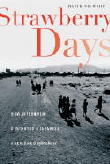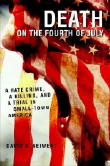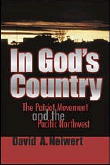Spyhopping the Right.

David Neiwert is a freelance journalist based in Seattle. He is the author of Strawberry Days: How Internment Destroyed a Japanese American Community (Palgrave/St. Martin's Press, June 2005), as well as Death on the Fourth of July: The Story of a Killing, a Trial, and Hate Crime in America, (Palgrave/St. Martin's, 2004), and In God's Country: The Patriot Movement and the Pacific Northwest (1999, WSU Press). His reportage for MSNBC.com on domestic terrorism won the National Press Club Award for Distinguished Online Journalism in 2000. His freelance work can be found at Salon.com, the Washington Post, MSNBC and various other publications. He can be contacted at dneiwert@hotmail.com.

Sara Robinson has worked as an editor or columnist for several national magazines, on beats as varied as sports, travel, and the Olympics; and has contributed to over 80 computer games for EA, Lucasfilm, Disney, and many other companies. A native of California's High Sierra, she spent 20 years in Silicon Valley before moving to Vancouver, BC in 2004. Her lifelong interest in the social effects of authoritarianism have most recently led her to pursue the MS in Futures Studies at the University of Houston. She's also a student member of the Association of Professional Futurists, and member of the Accelerated Studies Foundation advisory board on social and cultural issues. For fun, she raises kids and travels. You can reach her at srobinson@enginesofmischief.com.
Sara's recent series:
Cracks in the Wall: Parts I, II, and III.
Tunnels and Bridges: Parts I, II, III, and IV, plus a Short Detour.
Dave's recent series:
The March of the Minutemen
Intro: Parts 1, 2, 3, 4, 5, and 6.
Unhinged: Unhonest
Parts 1, 2, 3, 4, 5, and 6.
___
Other books by Dave [limited availability]:


"The Rise of Pseudo Fascism": An essay
Available in Adobe PDF format here
Support independent journalism:
Suggested $5 donation

Original posts: Part 1, Part 2, Part 3, Part 4, Part 5, Part 6, and Part 7.
______
Choice essays:
____
"The Political and the Personal"
____
"Bush, the Nazis and America":
Parts 1, 2, 3, and 4.
_______
Rush, Newspeak and Fascism: An Exegesis
[PDF file]
[Suggested $5 donation]
[In HTML: Parts I, II, III, IV, V, VI, VII, VIII, IX, X,, XI, XII, XIII, XIV and XV. See explanatory note.]
[Also available in HTML, and with art, at Cursor.]

_______
Orcinus Principium No. 1
Orcinus Principium No. 2
Why Orcinus?
|
|
| |
|
|
| |
|
|
|
|
|
|
| |
Holiday break
Tuesday, November 23, 2004
I'm off to Montana for a five-day Thanksgiving visit. My Web access will be sketchy, so don't look for a lot (if anything) till I get back.
I am planning to put "The Rise of Pseudo Fascism" together into a single PDF file that will appear after I get back. In the meantime, here are links to all seven parts:
- Part 1: The Morphing of the Conservative Movement
Part 2: The Architecture of Fascism
Part 3: The Pseudo-Fascist Campaign
Part 4: The Apocalyptic One-Party State
Part 5: Warfare By Other Means
Part 6: Breaking Down the Barriers
Part 7 [Conclusion]: It Can Happen Here
Have a happy Thanksgiving, everyone.
10:21 AM
Spotlight
The Dean draft
Monday, November 22, 2004
Joe Trippi, the old Howard Dean hand, posts the following at MSNBC:
- Finally the Democratic Party seems to be in complete denial that it needs to reform itself from the bottom-up. Forget about putting anyone in the chairmanship of the Democratic National Committee who is carrying water for any of the potential 2008 nominees. Forget about putting anyone in as Chair of the Party who is a figurehead, a symbol, or a placeholder. What the Party needs is someone who is committed to building a vibrant, energized party from the grassroots up to make gains in the House and Senate in 2006, and who will continue to build a party of ideas so that whoever wins the 2008 nomination is leading a modernized Party that can win the Presidency.
In other words -- stop the gamesmanship, and the politics as usual -- and put some outside the box thinking in place to build a new party from within.
The first and most critical step in reclaiming the Democratic Party is going to involve wresting it out of the hands of the clearly incompetent and out-of-step DLC folks and giving some fresh blood a chance -- and the first battle on that front is going to be naming a new chairman of the Democratic National Committee. I think we all have a pretty good idea who Trippi has in mind for this role: his old boss.
And you know what? Trippi is right.
There are a number of non-DLC people who might make better DNC chairs than Dean from an administrative or even ideological standpoint. But none of them are capable of unseating the DLC figureheads. None of them have the proven ability to put together a grass-roots organization and voter base. And none of them would have the ability to create a new coalition that crosses ideological lines.
I liked Dean in the primaries even though I figured he would get steamrolled in the general. Among other things, he remains the only candidate among the Democrats who articulated a vision of revitalizing the party's rural roots and finding a way to speak to working-class people again.
More to the point, that fact suggests the extent to which Dean is inclined to reject the stale approach to politics that has made the Democratic Party is moribund as it now finds itself. He's clearly the best first step in changing that.
To that end, please spend the time to visit the Web site created by Driving Votes featuring an online petition to encourage Dean to step up to the plate.
There's also a Draft Howard Web site that provides the latest on the effort to enlist Dean's leadership.
Democrats need to start from the ground up. Dean's the guy to do it.
4:57 PM
Spotlight
Intelligence on their designs
Science and fundamentalism are natural enemies, because they represent diametrically opposite models for understanding the world.
Fundamentalism begins with articles of faith, gleaned from Scripture, for which it then goes in search of evidence as support -- ignoring, along the way, all contravening evidence.
Science begins with the gathering of evidence and data, which are then assembled into an explanatory model through a combintation of hypothesis and further testing. This model must take into account all available facts, including contradictory evidence.
They are, in other words, 180 degrees removed from each other in how they affect our understanding of the world. One is based in logic, the other in faith. As methodologies go, they are simply irreconcilable.
Moreover, it's clear that the fundamentalists who are rapidly gaining complete control of the American government's reins of power fully recognize this natural emnity -- and intend to use their rising power to curtail the influence of science on society: in government, in the schools, and in the media.
To do this, they are resorting to a combination of logical fallacies and propaganda techniques.
The key piece of illogic is one that has especially lodged itself in the media in recent years: The notion that a demonstrably true fact can be properly countered by a demonstrably false one -- and that the two, placed side by side, represent a kind of "balance" in the national discourse. This is the Foxcist model of Newspeak, in which "fair and balanced" comes to mean its exact opposite.
[Linnaeus points out in comments that the logical fallacy at work here is the argumentum ad temperantiam: "If two groups are locked in argument, one maintaining that 2+2=4, and the other claiming that 2+2=6, sure enough, an Englishman will walk in and settle on 2+2=5, denouncing both groups as extremists."]
We've seen this dynamic play out constantly in the media over the past eight years or so: during the Clinton impeachment fiasco (when any kind of false rumor about Clinton got media play under these circumstances) to the 2000 election (from "Al Gore invented the Internet" to "machine counts are more accurate than hand counts") to the 9/11 commission hearings (notably Condoleezza Rice's testimony that the Aug. 11 Presidential Daily Briefing warning of pending Al Qaeda attacks contained just "historical information" and "did not, in fact, warn of any coming attacks") to the 2004 election (especially the way the media depicted the fact-driven reports on George W. Bush's military record as the counterpart to the Swift Boat Veterans clearly specious claims').
Now this model of illogic is being applied to our education system. Specifically, it's being used to inject religion into our schools' science education curriculum.
The most recent example of this came last week when the school board in Dover, Pennsylvania decided to include so-called "intelligent design" programs in their schools' science curriculum.
The chief advocates for "intelligent design" in the schools is a Seattle-based outfit called the Discovery Institute, which had its origins in the 1990s as a conservative/skeptic science-oriented think tank, but which in recent years has transformed its stance from skeptical to a full-fledged embrace of creationism.
Natasha at Pacific Views has been blogging a lot the last week or so about Discovery, notably with this post, followed by this one. Some of this plays off my old friend Danny Westneat's column about Discovery and the way it is using the nation's schools as the battleground for their debate. Natasha notes:
- Science is founded on asking questions, even about long-established ideas. Yet a truly 'tough' question is one that's based on evidence, and a question that's asked out of uninformed antagonism doesn't merit the respect of being described that way. So in this, they are certainly making progress in getting their message out, but that message doesn't contain a single "legitimate scientific criticism."
Evolution Blog recently offered a detailed explanation of this:
- The great Columbia University genetecist Theodosious Dobzhansky famously said "Nothing in biology makes sense except in the light of evolution." What did he mean by that?
In a trivial sort of way there are many things in biology that make perfect sense even without evolution. The structure of DNA, the mechanics of the Krebs cycle, the skeletal structure of the water buffalo, all of these facts can be understood without any reference to Darwin or his theories.
But of course, the same could be said for any branch of science. Brute facts can be learned and understood without any reference to theory at all. Plainly, this is not what Dobzhansky had in mind.
What he intended was that evolution is what transforms biology from a chaotic menagerie of unrelated facts into an actual science. For example, the fossil record shows a clear pattern to life's history. We begin with the simplest sort of one-celled organisms around 3.5 billion years ago, and move gradually through more complex single-celled organisms, simple multicellular organisms, and on and on through fish, amphibians, reptiles and humans. Along the way we find numerous examples of transitional series in which, for example, the reptilian skull seems to transform itself gradually into the mammalian skull. Without evolution we must simply accept this history as a brute fact. Intelligent Design offers no explanation of it, and the Young-Earth Creationists offer an explanation (that the patterns in the fossil record represent the different abilities of animals to escape the rising waters of Noah's flood) so clearly at odds with the facts that it can't be taken seriously. Salvador, if you reject evolution, tell me how I am to understand the fossil record.
Wired also recently ran a piece about the Discovery Institute titled "The Crusade Against Evolution" that surveys the breadth of Discovery's successes elsewhere:
- Several months after the debate, the Ohio school board voted to change state science standards, mandating that biology teachers "critically analyze" evolutionary theory. This fall, teachers will adjust their lesson plans and begin doing just that. In some cases, that means introducing the basic tenets of intelligent design. One of the state's sample lessons looks as though it were lifted from an ID textbook. It's the biggest victory so far for the Discovery Institute. "Our opponents would say that these are a bunch of know-nothing people on a state board," says Meyer. "We think it shows that our Darwinist colleagues have a real problem now."
But scientists aren't buying it. What Meyer calls "biology for the information age," they call creationism in a lab coat. ID's core scientific principles -- laid out in the mid-1990s by a biochemist and a mathematician -- have been thoroughly dismissed on the grounds that Darwin's theories can account for complexity, that ID relies on misunderstandings of evolution and flimsy probability calculations, and that it proposes no testable explanations.
As the Ohio debate revealed, however, the Discovery Institute doesn't need the favor of the scientific establishment to prevail in the public arena. Over the past decade, Discovery has gained ground in schools, op-ed pages, talk radio, and congressional resolutions as a "legitimate" alternative to evolution. ID is playing a central role in biology curricula and textbook controversies around the country. The institute and its supporters have taken the "teach the controversy" message to Alabama, Arizona, Minnesota, Missouri, Montana, New Mexico, and Texas.
The key to Discovery's success is in twisting science's own precepts against it, imposing the same illogical pseudo-egalitarianism -- "all ideas are equal in value" -- so that it distorts the work of science by giving false facts an equal footing with true facts:
- Of course Meyer happily acknowledges that Woese is an ardent evolutionist. The institute doesn't need to impress Woese or his peers; it can simply co-opt the vocabulary of science -- "academic freedom," "scientific objectivity," "teach the controversy" -- and redirect it to a public trying to reconcile what appear to be two contradictory scientific views. By appealing to a sense of fairness, ID finds a place at the political table, and by merely entering the debate it can claim victory. "We don't need to win every argument to be a success," Meyer says. "We're trying to validate a discussion that's been long suppressed."
This is precisely what happened in Ohio. "I'm not a PhD in biology," says board member Michael Cochran. "But when I have X number of PhD experts telling me this, and X number telling me the opposite, the answer is probably somewhere between the two."
An exasperated Krauss claims that a truly representative debate would have had 10,000 pro-evolution scientists against two Discovery executives. "What these people want is for there to be a debate," says Krauss. "People in the audience say, Hey, these people sound reasonable. They argue, 'People have different opinions, we should present those opinions in school.' That is nonsense. Some people have opinions that the Holocaust never happened, but we don't teach that in history."
As with the media phenonmena of the past decade, this is what happens when you engage in this kind of false "balance": When falsehoods are given equal consideration with demonstrable facts as merely the "other side" in a debate, the falsehoods win, because they gain credibility they would otherwise never have.
Even the normally reserved National Geographic Society decided it was time to address the matter head-on last month with its lead article, "Was Darwin Wrong?" The answer, simply and resoundingly, is "no."
But science isn't really the question here. P.Z. Myers points out that the Discovery Institute is not engaged in science -- its purview is propaganda.
Specifically, it's a form of card stacking:
- Propagandist uses this technique to make the best case possible for his side and the worst for the opposing viewpoint by carefully using only those facts that support his or her side of the argument while attempting to lead the audience into accepting the facts as a conclusion. In other words, the propagandist stacks the cards against the truth. Card stacking is the most difficult technique to detect because it does not provide all of the information necessary for the audience to make an informed decision. The audience must decide what is missing. The Institute for Propaganda Analysis suggests we ask ourselves the following question when confronted with this technique: Are facts being distorted or omitted? What other arguments exist to support these assertions? As with any other propaganda technique, the best defense against Card Stacking is to get as much information that is possible before making a decision.
There's another important aspect to propaganda as well: When it's being deployed, it is always in the service of a larger and often hidden agenda. In the case of the Discovery Institute and the "intelligent design" curriculum, it's just a matter of following the money.
One of the chief funders of Discovery (and the first entity on its Board of Directors) is a fellow named Howard Ahmanson. Ahmanson is a major figure in the Christian Reconstructionist movement, whose agenda is to convert American government to a theocratic system as a "Christian nation".
Ahmanson is nothing if not diverse. Among Ahmanson's other projects has been the directorship of the Rutherford Institute, which gained some notoriety as the providers of Paula Jones' legal team in her harassment suit against Bill Clinton; and his connection to the controversy over electronic voting systems by virtue of his ownership of a major touch-screen system provider.
But Discovery has been a major recipient of Ahmanson's funds, as the Cleveland Plain Dealer explained a couple of years ago:
- Ahmanson, whose family made billions in the savings and loan business, was associated at times with Christian Reconstruction, a radical faction of the Religious Right that sought to replace American democracy with a theocracy based on biblical law and under the "dominion" of Christians. For years, the Orange County multimillionaire served on the board of the Chalcedon Foundation, the movement's think tank.
Ahmanson gave Discovery $1.5 million to help start its Center for Science and Culture. Fieldstead & Co., which is owned by Ahmanson and his wife, Roberta, has pledged $2.8 million through 2003 to support the institute's work.
The prospect of slowing down this campaign appears dim -- especially considering that George Bush has a long history of pandering to the Reconstructionists.
For more information, be sure to also check out the work by P.Z. Myers at Pharyngula, and by Chris Mooney, both of whom have been tracking the Discovery Institute closely.
1:03 PM
Spotlight
The last Indian war
Sunday, November 21, 2004
I have a new post up at The American Street on the latest right-wing plans to do away with Native American treaty rights. Enjoy.
10:15 PM
Spotlight
|
|
| |
|
|
|